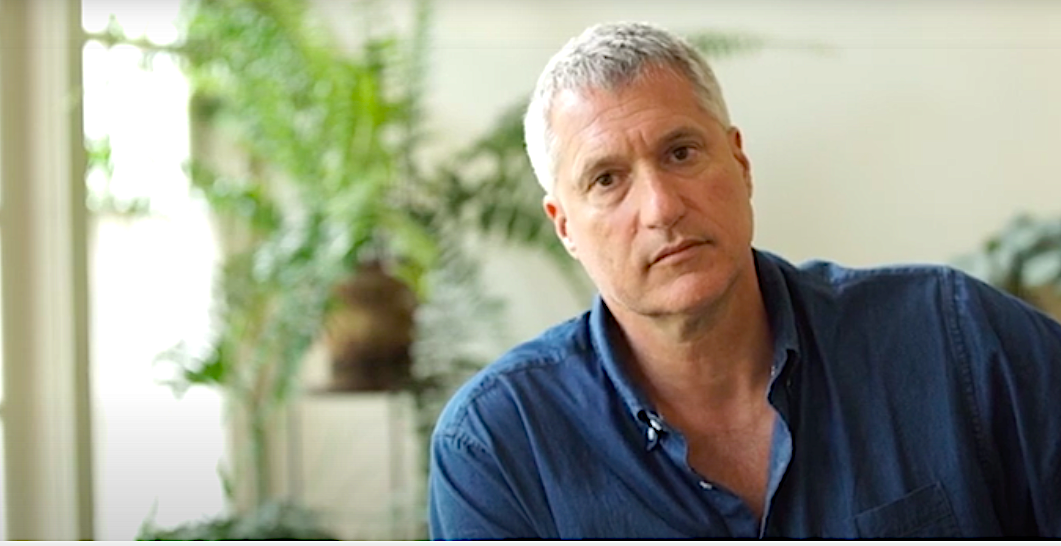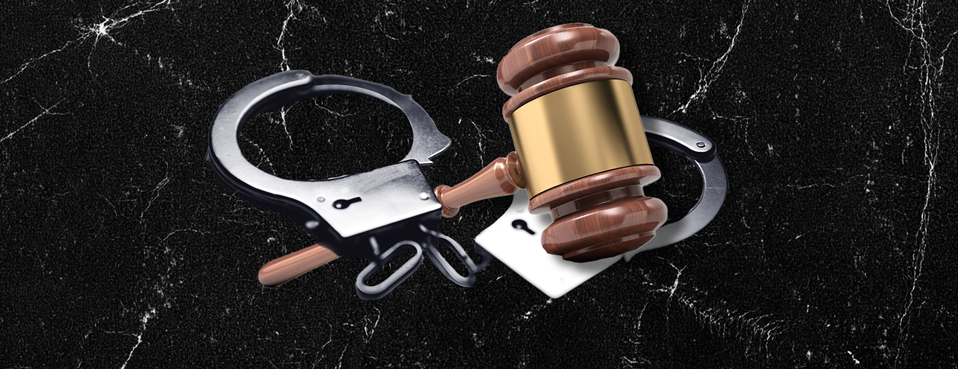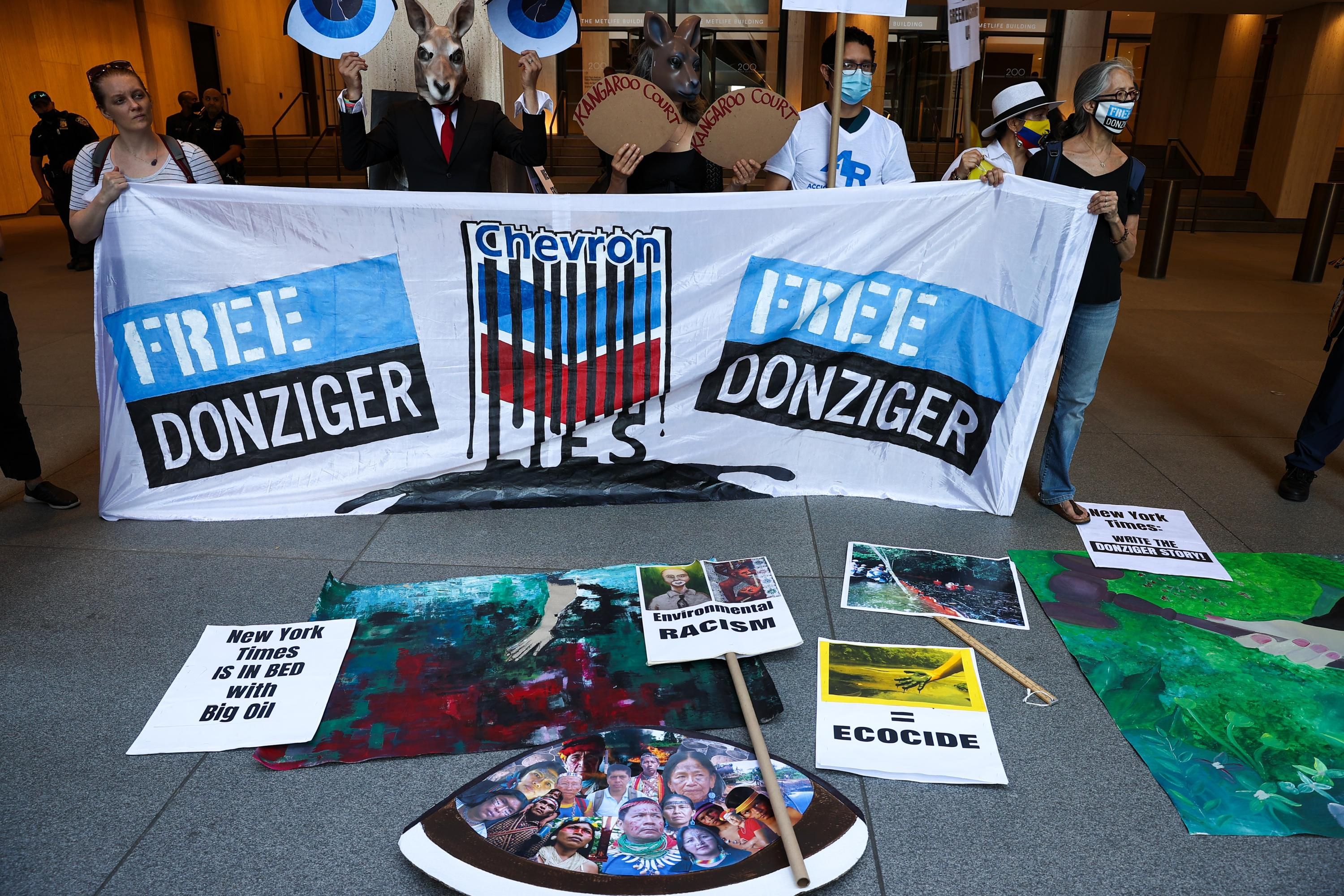
Steven Donziger’s Sentencing Is Meant to Have
A ‘Chilling Effect’ on Environmentalists
Marianne Williamson / The Hill
(October 4, 2021) — Former presidential candidate and environmental activist Marianne Williamson said on Monday that the six-month prison sentence given to former environmental lawyer Steven Donziger last week is designed to have a “chilling effect” on environmentalists.
Donziger, who successfully secured a $8.5 billion judgment against Texaco in 2011, was sentenced to six months in prison on Friday for contempt charges related to legal proceedings that began in Ecuador a decade ago. Donziger has already served more than two years in house arrest and supporters have decried the sentencing as retaliatory, which Williamson agreed with.
“[US District Judge Loretta Preska] is expressing the outrage of Chevron, and by extension all oil companies, at the audacity of Steven Donziger and by extension the entire environmentalist movement to challenge its hegemony,” Williamson said.
“It’s meant to have a chilling effect on any of us in the environmental movement or just citizens of the planet who say this has got to stop,” Williamson added. She accused Preska of speaking on behalf of Chevron, rather than on behalf of the US justice system.
Donziger’s sentencing came just days after the United Nations’ Working Group on Arbitrary Detention condemned his years-long house arrest for violating international laws.
Explaining her July conviction of Donziger, Preska wrote “a lawyer, of all people, should know that in the face of a perceived injustice, one may not take the law into his own hands.”
Watch part of Williamson’s interview below:
Former Environmental Lawyer Steven Donziger
Sentenced to Six Months on Contempt Charges
(October 1, 2021) — A federal judge on Friday sentenced former environmental lawyer Steven Donziger to six months in prison after finding him guilty on contempt charges in July.
Donziger in the 1990s sued Texaco on behalf of Ecuadorian farmers and Indigenous people, securing an $8.5 billion judgment in 2011. The same year, Chevron, which had since acquired the company, countersued and accused Donziger of bribery and evidence tampering.
A federal judge found in Chevron’s favor, overturning the award and later charging Donziger with contempt. Donziger, who has been under house arrest for two years, was disbarred in 2018. Judge Lewis Kaplan took the unusual step of appointing private attorneys as prosecutors in the case after federal prosecutors with the Southern District of New York declined to take it. One of the attorneys appointed previously worked for a firm Chevron has retained.
In passing the sentence Friday, US District Judge Loretta Preska accused Donziger of an “astonishing lack of respect for the law” and “spen[ding] the last seven years thumbing his nose at the judicial system,” according to Bloomberg.
The sentence comes the day after the United Nations’ Working Group on Arbitrary Detention condemned Donziger’s house arrest and called for his immediate release, noting that he has already been detained longer than the maximum sentence for the charges.
“In this regard the Working Group recalls that the Human Rights Committee has argued that ‘[I]f the length of time that the defendant has been detained reaches the length of the longest sentence that could be imposed for the crimes charged, the defendant should be released,” the group added.
“As I face sentencing on Day 787 of house arrest, never forget what this case is really about,” Donziger tweeted Friday morning. “Chevron caused a mass industrial poisoning in the Amazon that crushed the lives of Indigenous peoples. Six courts and 28 appellate judges found the company guilty. Fight on.”
As I face sentencing on Day 787 of house arrest, never forget what this case is really about. @Chevron caused a mass industrial poisoning in the Amazon that crushed the lives of Indigenous peoples. Six courts and 28 appellate judges found the company guilty. Fight on.
“I think it was outrageous and totally predictable,” Martin Garbus, one of Donziger’s attorneys, told The Hill, “and I’m very sad about it.”
Steve Donziger Maximum Sentence Is Human Rights Abuse

Steven Donziger: Imprisoned by the 1 Percent’s Favorite Judge
(October 8, 2021) — Loretta Preska, the judge who did Chevron’s bidding in the case against activist Steven Donziger, has a history of conflicts of interest and pro-corporate rulings. And she’s not alone — corporate influence and conflicts of interest are rampant in the courts.
Last week, Chevron finally secured judicial retaliation against Steven Donziger, the human rights lawyer who helped secure a historic $9.5 billion judgment against the company ten years earlier over their pollution of the Amazon rainforest in Ecuador. After an unprecedented 787 days in pretrial home detention, Donziger was sentenced last Friday to a maximum six months in prison for contempt of court by Loretta Preska, judge for the Southern District of New York, who said that “only the proverbial two-by-four between the eyes will instill in him any respect for the law.”
Preska’s conduct had been a focal point of the trial ever since she was, against local rules, handpicked to oversee the case by judge Lewis A. Kaplan, the Chevron-invested former tobacco industry lawyer who had blocked the judgement against the company and launched the contempt case. Preska denied Donziger’s request for a jury trial, barred Zoom access to the trial for the public, and consistently ruled againstDonziger’s legal team. She refused to hear from Donziger’s lawyers about why he had drawn the contempt charge by not turning over his laptop and phone — namely, to protect attorney-client privilege — and at one point sat and read newspapers while presiding over the proceedings.
Critics pointed to Preska’s seat on the advisory board of the New York chapter of the Federalist Society, the right-wing judicial lobby of which Chevron is a donor. But even before then, Preska’s history of business ties and pro-corporate rulings made her an ideal pick to carry out the company’s reprisal on Kaplan’s behalf.

Confluence of Interest
The Donziger case isn’t the first time those connections created a conflict of interest for the judge. Back in 1995, three years after she had been approved for the court, Preska presided over a copyright case involving the Twin Cities–based West Publishing Company, despite her and her husbands’ connections to the firm. (Preska’s husband, Thomas Kavaler, is a nearly forty-year veteran of and partner at Cahill Gordon & Reindel, a top corporate law firm that specializes in the world of finance). It was only when pressed by one of the litigants, forcing her to admit relationships with two West employees, including a lawyer who was key to the case, that she recused herself.
Seventeen years later, Preska presided over the case of “hacktivist” Jeremy Hammond who was under trial for hacking into various law enforcement agencies and private security firms, including Strategic Forecasting Limited, or Stratfor, which counted the Pentagon and Department of Homeland Security among its clients.
As the hacking group Anonymous pointed out, and noted by almost no news outlets besides the likes of RT, Rolling Stone, or journalists like Chris Hedges, Preska’s husband was one of the Stratfor customers whose data had been hacked, and who would have been eligible for a payout from the multimillion-dollar class-action suit against the company that resulted. Sratfor had also spied on the Occupy Wall Street movement, a movement in direct opposition to Preska’s husband’s client base, and more than twenty of his firm’s clients had been caught up in the hack, including Merrill Lynch.
Despite this clear conflict of interest — and despite telling senators at her confirmation hearing decades before that “through my husband, I might be thought to have an indirect financial interest in the profits of the law firm of Cahill Gordon & Reindel” — Preska refused to recuse herself from the case. Doing so, she said, “would only encourage supporters of this defendant — or other defendants — to allege unsubstantiated conflicts of interest against any of my brothers and sisters of the Court until no judge remained qualified to hear his case.”
With echoes of the Donziger case, Preska denied Hammond bail, leaving him in federal prison for a year, much of it spent in solitary confinement, before sentencing him to the maximum ten years in prison, citing a “need for adequate public deterrence.”
(Ironically, Hammond claimed to have been unwittingly used by the FBI to hack various foreign governments, whose identity Preska unsuccessfully tried to keep secret. His alleged handler, the hacker-informant Hector Xavier Monsegur, known by the online pseudonym Sabu, ended up playing a principal role in his arrest, and we now know was also instructed by the FBI to hack the Icelandic government, to create a pretext for the Bureau to enter the country and pursue Julian Assange. Preska made sure to give Sabu an extraordinarily lenient sentence for his troubles).
Sometimes Preska ruled on cases where one of the parties merely later became one of her husband’s firm’s clients. In 1993, she made the dubious ruling that credit rating agencies had the same constitutional protections as newspapers, in line with the wishes of Standard & Poor (S&P) to avoid disclosing its records of meetings in a suit involving two airlines.
The folly of giving them First Amendment protections was made viscerally clear fifteen years later, when the big three ratings agencies, including S&P, abetted and profited from the risky behavior of the investment banks that crashed the global economy. Later, through the 2010s, Cahill Gordon represented S&P in several lawsuits and an acquisition, boasting of defending the company in matters relating to its rating of securities prior to the crash.
In 2000, Preska ruled in favor of Coca-Cola in a lawsuit brought by Pepsi challenging its monopolistic practice of “loyalty” contracts with food service distributors; later, in the 2010s, Cahill Gordon advised and represented Coke in several mergers. And Cahill Gordon represented Merrill Lynch before, after, and in the same year that Preska ruled in favorof the investment firm in several cases.
While technically permissible, it’s an open question whether it’s a good system to let judges preside over cases where one party has a high chance of being a future client of their spouse, given Cahill Gordon’s status as go-to attorneys for Wall Street and Fortune 500 companies.
In any case, Kavaler’s corporate work paid off for the couple. As a federal judge, Preska made a mere six-figure salary. But with Cahill Gordon’s partners earning nearly $4 million a year on average, in 2014, the couple was able to buy a $8.7 million three-bedroom penthouse on Manhattan’s Upper East Side from disgraced former Bear Stearns chairman Richard Harriton, who settled a civil fraud suit with the Security and Exchange Commission for $1 million before being barred from the securities industry.
Though Harriton had resigned more than a decade earlier, it added a layer of unseemliness to Preska’s 2018 ruling that the Consumer Financial Protection Bureau should be eliminated — in a case revolving around scammers tricking 9/11 victims and injured ex-NFL players into taking out high-interest loans, no less — given that the agency had been born directly out of large-scale fraud at Bear Stearns, albeit a different kind to Harriton’s.

A Reliable Soldier
Beyond this, Preska, as might be expected from a Federalist Society judge, has a history of pro-corporate rulings quite apart from any conflicts of interest, with bad outcomes for working people. In 2003, Preska refused to block the Department of Housing and Urban Development’s sale of the South Bronx Pueblo de Mayaguez low-income housing development to a private developer. The seventy-five-unit development was eventually sold to Emmanuel Ku, a slum lord with fourteen hundred outstanding code violations, $23,000 worth of fines, and a lawsuit against him.
Two years later, Preska tossed out a suit by eight state attorneys general against five of the country’s largest electric utilities and responsible for 10 percent of its carbon emissions, asking the courts to order them to reduce emissions over the decade. Preska declined, arguing that “all it does is slow it down” and “won’t reduce the threat” — to which one lawyer replied they were only asking for emissions to be reduced, not to solve climate change — and pointed tothe “several steps” taken by Congress and the White House “to better understand and address the complex issue of global warming.” Those steps were Congressional requests for more information about the issue and George W. Bush’s 2002 withdrawal from the Kyoto Protocol, akin to the Paris climate accord of its time.
In 2010, Preska was picked again to decide a case, this time by Bloomberg LP’s lawyer, who wanted her to rule on the lawsuit brought against the company by seventy-nine women who alleged pregnancy discrimination, instead of a jury. Despite the plaintiffs’ certainty that Preska would want a jury to decide, she instead dismissed it, calling the claims merely “several isolated incidents of individual discrimination,” pointing to the company’s massive size, and that nearly 90 percent of the company’s pregnant or mother employees had no claims.
Preska then went further, adding that “the law does not require companies to ignore or stop valuing ultimate dedication, however unhealthy that may be for family life,” and that businesses weren’t mandated to “ignore employees’ work-family trade-offs when deciding about employee pay and promotions.” Michael Bloomberg’s personal history of breathtaking misogyny toward his pregnant employees later became a flashpoint in the 2020 Democratic primary.
Three years after that, Preska refused to block a mega-merger between American Airlines and US Airways, charging there was no evidence the anticompetitive behavior would cause harm to consumers. This, despite the fact that copiousevidence existed showing worse outcomes for fliers as the majority of air traffic became consolidated under just four airlines. These are just a small sample of the decisions that must have made Preska an ideal choice to deliver Chevron’s legal reprisal against Steven Donziger.

Just One of Hundreds
This is about more than just judge Preska, though of course her role in the Donziger case and others where her impartiality was challenged (to say the least) is important.
According to a recent Wall Street Journal report, since 2010, more than a hundred thirty federal judges have failed to follow the law and judicial ethics and recuse themselves from as many as 685 cases that involved companies they owned stocks in. Two-thirds of their rulings in contested motions ended up in favor of the businesses they were invested in, according to the paper. Who knows how many more judges are like Preska, holding potential conflicts of interest through the financial interests of their spouses, rather than direct investments.
The Donziger case is an example of breathtaking institutional corruption, but it’s only the most dramatic, hard-to-believe instance of the way that business power has infected the unusually powerful US courts. As Preska’s career shows, corporate America has found a way to shape ordinary people’s lives through the courts in all manner of quieter, more understated ways.
Posted in accordance with Title 17, Section 107, US Code, for noncommercial, educational purposes.